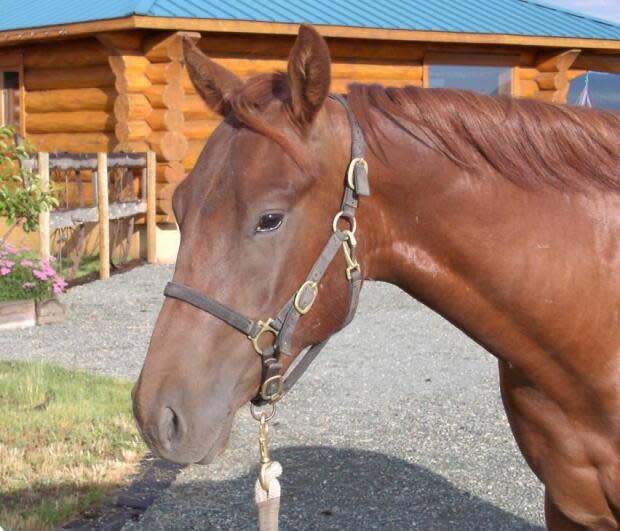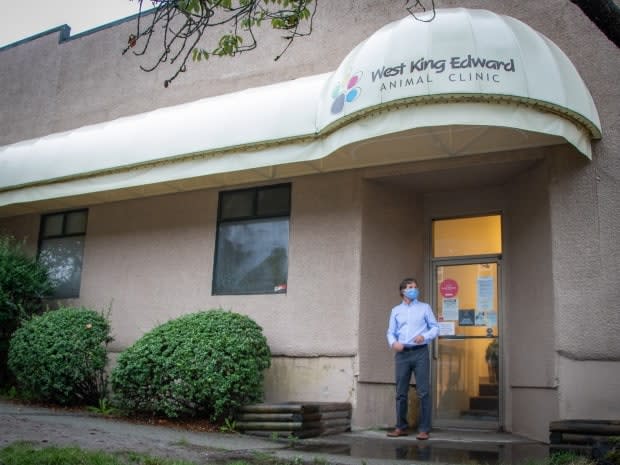'Animals are suffering': B.C. veterinary shortage exacerbated by pandemic
When Cheryl Shellenberg checked in on her horse Jonesy as she was racing him to a veterinarian, he was dead in his trailer, his eyes rolled back and his tongue sticking out.
The 18-year-old quarter horse had died in agony of colic as Shellenberg, 62, was stuck in Powell River, B.C., waiting in line to get on a ferry across the Salish Sea to Comox on a Sunday morning in late September.
"I felt terrible that I'd let him suffer," Shellenberg said, choking up. "Had I known this was how his life was going to end, I would have got somebody out on Saturday with a gun and we would have shot him."
For Shellenberg and others on the Sunshine Coast, a bullet to the head is the most humane emergency care they can access for their horses.

The Society of B.C. Veterinarians says there has been a shortage of veterinarians throughout the province for years, but the issue has gotten worse during the pandemic as more people take in new pets and COVID-19 protocols restrict the number of people inside clinics.
"We know for sure that animals are suffering for lack of veterinary care," said Corey Van't Haaff, the society's executive director. "And we know for sure they're dying."
The problem is most acute in rural areas, but urban pet owners have noticed it as well. Some veterinarians in Vancouver are reporting wait times of up to six weeks.
'We're busier than ever'
Inside Dr. Rob Ashburner's 900-square-foot clinic near the intersection of Cambie Street and King Edward Avenue, veterinary technicians and assistants dodge a 12-pound tabby named Hugo as they take calls, set out treats and ensure all their supplies are stocked in time for the first appointment of the day.
"We're busier than ever," Ashburner said, standing in the examining room at the West King Edward Animal Clinic.
"From a business point of view, that's good. But we feel badly because our patients go without proper care, or have to delay care."

Most of Ashburner's patients have to wait about two weeks for an appointment. Urgent matters are referred to the emergency hospital, which costs more.
Ashburner says he would love to hire another veterinarian for his clinic, but in B.C. that task is "almost impossible."
According to a report the Society of B.C. Veterinarians commissioned two years ago, there is a growing shortage of about 100 vets each year in B.C.
To help solve the problem, Ashburner and other veterinarians want the Ministry of Advanced Education to pay for more spots for B.C. students at the Western College of Veterinary Medicine in Saskatoon — the closest place in Canada where B.C students are eligible to train.
20 new spots available
Currently, the province pays the college for 20 B.C. students each year at a cost of about $2 million. The students pay $11,000 for each year of the four-year program.
Twenty new spots became available this fall because Alberta has chosen to invest more in its own program, for Albertan students, freeing its seats up. But B.C. declined to take advantage of the opportunity, choosing instead to renew its current level of funding. The ministry said it couldn't comment on the situation because of the upcoming election.
Van't Haaf says she has tried for at least two years to meet with Melanie Mark, the minister of advanced education in the last government, but said Mark did not return her calls.
"We did not understand why she would not provide these extra seats for very necessary veterinarians," Van't Haaf said.

Some of the extra spots did get taken up by 16 students from B.C., Ashburner says, but because they're not funded students need to pay about $60,000 in annual tuition. Ashburner says not only is that unfair, it's unsustainable because the average salary for veterinarians in B.C. is about $85,000 per year.
The society is looking at other avenues to attract more veterinarians to the province. One of them is making it easier for foreign-trained vets to become accredited here.
But for Ashburner and his colleagues, funding more training and taking advantage of the 20 new spots at the Western College of Veterinary Medicine is one of the clearest solutions available.
"We as veterinarians feel the shortage is a very correctable problem," he said.


